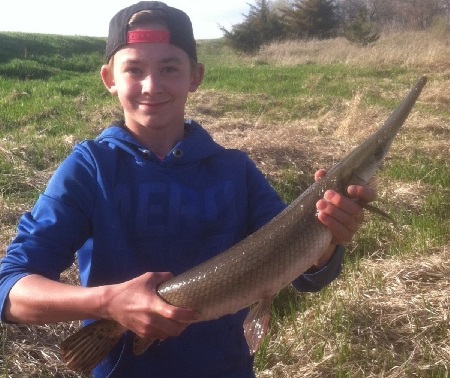 Interest has ramped up this spring in the state record fish program of the Minnesota Department of Natural Resources, with five applications for four species including everything from shortnose gar, lake sturgeon, golden redhorse and the quillback carpsucker.
Interest has ramped up this spring in the state record fish program of the Minnesota Department of Natural Resources, with five applications for four species including everything from shortnose gar, lake sturgeon, golden redhorse and the quillback carpsucker.
“This is by far the wildest, craziest spring we’ve ever had. We’ve never had so many record submissions and so much interest in such a short span of time,” said Mike Kurre, state record fish program coordinator. “They’re are all impressive catches and show interest in the program is growing and that there are some huge fish out there in Minnesota.”
There are two kinds of Minnesota state records: One for catching and keeping the biggest fish in each species based on certified weight; and the other for the length of a caught and released muskellunge, lake sturgeon or flathead catfish.
A bump-up in applications for record fish shows interest in the state record fish program, but a bump in records tells little about an angler’s overall chances of catching a large fish.
Someone’s chances of catching a lunker depend on a variety of factors including the species and location. Anglers fishing for lake sturgeon, for example, now have better chances of catching large ones because of the recovery and restrictive harvest regulations have led to their numbers increasing.
On the level of individual fish, catch-and-release fishing often means large fish returned to the water can keep growing.
“Anglers are in some cases benefiting from good fisheries management decisions and environmental cleanup of past decades, especially when it comes to long-lived fish like sturgeon,” Kurre said. “In some cases, specific state record holders probably wouldn’t have the record without other anglers releasing that fish in the past.”
Anglers also might be taking more of an interest in identifying and trying to catch obscure species – like golden redhorse or shortnose gar – and boosting their personal life-lists for species caught. Such was the goal in the case of one recent record.
“The newest record for the shortnose gar involved a cool story of a father and son who set out to fill out their life species list and were targeting some of the more obscure fish,” Kurre said. “They succeeded and not only are they up to 45 out of the recognized 62 state record fish on their list, they have a new state record with a shortnose gar.”
So far the record count this year stands at four: a 5-pound 4-ounce shortnose gar caught by Cayden Hutmacher; two caught and released lake sturgeon that were 70 inches long caught by Tim Deiman and Mark Minnick; and a 4-pound 7-ounce golden redhorse caught by Mathew Williams.
Social media even fueled some recent speculation that there would be two other candidates for flathead catfish records after photos surfaced of anglers who caught, photographed and released large catfish on the Minnesota River the same day on May 15, about 100 miles apart from each other. The fish may have ended up tied with the current 49-inch length record; however, one of the anglers didn’t have a witness and the DNR hasn’t received a record application for the other.
The largest catch-and-release record submitted for consideration this year came from the Minnesota-Canada border waters, a submission that stated it as a 72-inch lake sturgeon. Unfortunately, there was no photo of that fish on the ruler so it could not be certified as a record. There was also an application for a quillback carpsucker that turned out to be a bigmouth buffalo.
“Some of the potential records submitted for the catch-and-release category haven’t had a photo of the complete fish on a ruler,” Kurre said. “It’s understandable, since outside a cadre of top-level anglers, few go out fishing expecting to catch one of these huge fish. Or, in the other cases, solo anglers would have just needed to take someone else fishing with them.”
Kurre recommends anglers become familiar with the record-fish guidelines and be ready to take the required photos and go through the correct procedures for submitting the record – especially when equipped with the fishing tackle and on waters where they might catch record fish.
The DNR will in coming weeks announce new state records in news releases and online. Find current records and guidelines for each type of state record at mndnr.gov/recordfish. www.postbulletin.com reported this first by
